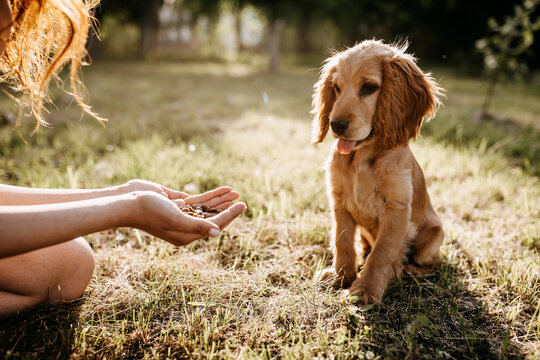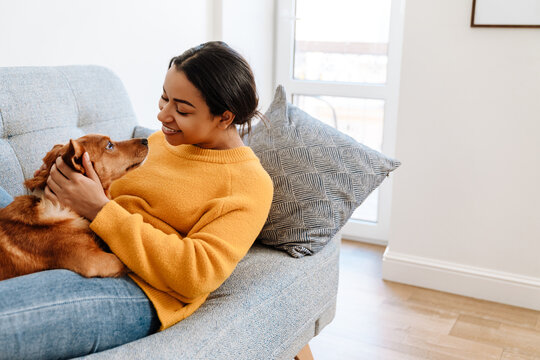Are you thinking of becoming a first-time dog owner? Congratulations! Bringing home a furry friend is an exciting and rewarding experience. However, it can also be overwhelming and nerve-wracking, especially if you’re not quite sure what to expect. But fear not! In this ultimate guide, we’ll share with you some essential tips that every first-time dog owner should know. From preparing your home for your new arrival to establishing routines and training techniques, we’ve got you covered. So grab a cup of coffee, sit back, and let’s dive into the world of first-time dog ownership together!
Preparing Your Home for Your New Furry Friend: First Time Dog Owner Tips
First time dog owner tips are important to consider before bringing home your new furry friend. Preparing your home is the first step in ensuring a smooth transition. Dog-proofing means keeping things out of reach such as electrical cords, cleaning supplies, and small objects like toys or jewelry that may be dangerous if ingested. Create a designated space for your pup with comfortable bedding and access to food and water.
Stock up on essential dog supplies, including food, treats, chew toys, leashes, collars with identification tags attached, and grooming tools such as nail clippers and brushes. Make sure you have scheduled appointments with vets for vaccinations or checkups.
Set rules early by creating boundaries around where your pup can go in the house or yard using baby gates or crates. You can also decide whether they are allowed on furniture or which areas of the house are off-limits from the start. Consistent reinforcement will help them understand what is expected of them.
Lastly but most importantly give plenty of love and patience during this exciting journey!
The Dos and Don’ts of Training Your First Dog: Tips from Pet Experts
Training your first dog can be an exciting but daunting task. It’s important to establish a routine and set clear boundaries from the beginning. Consistency is key when it comes to training, so make sure everyone in the household is on the same page. Positive reinforcement is a highly effective training method that involves rewarding good behavior rather than punishing bad behavior. Clicker training is a popular form of positive reinforcement that uses a clicking sound to mark desired behavior, followed by a treat or praise.
On the other hand, punishment-based training methods such as yelling or physical discipline can be harmful and may damage the bond between you and your furry friend. Remember that dogs thrive on positive attention and affection, so make sure to shower them with love and praise when they do something right. It’s also important to socialize your dog from an early age by exposing them to different people, animals, and environments. This will help them become well-adjusted and confident adult dogs. With patience, consistency, and positive reinforcement, you can train your first dog like a pro!
Health and Wellness Essentials for First Time Dog Owners: A Comprehensive Guide
As a first time dog owner, it’s important to prioritize the health and well-being of your furry friend. Here are some essentials that you should keep in mind:
- Regular visits to the vet: Just like humans, dogs need regular check-ups to ensure that they are healthy. Take your pup for annual exams and vaccinations, and don’t hesitate to schedule an appointment if you notice any concerning symptoms.
Proper nutrition: Feeding your dog a balanced diet is crucial for their health. Make sure their food contains all the necessary nutrients and avoid giving them too many treats or table scraps.
-
Exercise: Dogs need regular exercise to stay healthy both physically and mentally. Depending on breed and age, this could include walks, runs, or playtime at home.
-
Grooming: Regular grooming helps maintain hygiene as well as bonding between you and your dog. Brushing teeth regularly ensures dental health whereas bathing keeps skin clean & coat shiny.
By prioritizing these aspects of your dog’s health care routine from day one, you can help set them up for a long life full of tail wags!
Building a Strong Bond with Your Pup: Communication Tips for First Time Dog Owners
Understanding Your Dog’s Body Language: Tips for Effective Communication
Understanding your dog’s body language is crucial for effective communication as a first time dog owner. Dogs use their body to express their emotions and intentions, and it’s important to be able to interpret these signals. For example, a wagging tail can indicate happiness or excitement, while a tucked tail can indicate fear or anxiety. Other important body language cues include ear position, eye contact, and overall posture. By paying attention to your dog’s body language, you can better understand their needs and wants, and build a stronger bond with them. Remember to always approach your dog calmly and respectfully, and give them space when needed.
The Importance of Consistency in Training and How to Achieve It
Consistency in training is crucial for first time dog owners to build a strong bond with their furry friends. Dogs thrive on routine and repetition, so it’s important to establish clear rules and boundaries from the start. Use positive reinforcement techniques such as treats, toys, and praise to reward good behavior consistently. Avoid confusing your pup by being consistent with commands and cues – use the same words or signals every time. Set aside regular training sessions each day to practice obedience skills like sitting, staying, and heeling. With patience and consistency in training methods, you’ll be well on your way to developing a loving relationship with your new canine companion!
Creating a Positive Environment for Your Pup: Simple Strategies for Success
A positive environment is crucial to building a strong bond with your furry friend. Consistency and patience are key when creating this positive atmosphere in your home. Set clear boundaries for your pup, while also providing plenty of love and affection. Use positive reinforcement techniques, such as treats or praise, to reinforce good behavior.
Additionally, make sure that your dog has access to all the essentials they need for their physical and mental well-being. These include nutritious food, fresh water, comfortable bedding, toys for playtime and regular exercise. By meeting these basic needs and showing them love through positive communication methods,you can create an atmosphere that will help you form a deep bond with your new furry friend.
Strengthening the Human-Dog Bond through Playtime and Interactive Activities
Playing and engaging in interactive activities with your furry friend is a great way to strengthen the bond between you and your dog. Regular playtime not only provides physical exercise for your pup but also helps to release endorphins that promote positive feelings and reduce stress. It’s important to choose activities that both you and your dog enjoy, such as fetch, tug-of-war, or hide-and-seek. Training games like “find it” or “red light, green light” can also be fun and mentally stimulating for your pup. Remember to always reward good behavior with treats or praise to reinforce positive communication between you and your furry friend.
Navigating Common Challenges of Being a First Time Dog Owner: Expert Advice
First time dog owner tips can be helpful, but sometimes you may encounter unexpected challenges. It’s important to know that you’re not alone and many other new dog owners have faced similar situations. One common challenge is separation anxiety, which occurs when your pup becomes anxious or distressed when left alone. To address this issue, start by gradually increasing the amount of time your pup spends alone and try not to make a big deal about leaving or returning home.
Another challenge for first-time pet parents is dealing with their furry friend’s behavioral issues such as chewing or excessive barking. It’s best to train dogs as early as possible using positive reinforcement techniques like treats, praises, and affection. You can also engage in stimulating activities with your dog such as playing fetch or going on walks so they get enough exercise and mental stimulation.
Lastly, always remember that caring for a new pet requires patience and understanding! Don’t hesitate to reach out to a professional if needed – it’s never too late for some expert advice from an experienced vet or trainer who specializes in helping first-time dog owners navigate this exciting yet challenging journey.
In conclusion, being a first time dog owner can be both exciting and overwhelming. However, with the right preparation, training, and care, you can build a strong bond with your furry friend that will last a lifetime. Remember to create a safe and comfortable environment for your pup, seek advice from pet experts, prioritize their health and wellness, communicate effectively with them, and navigate common challenges with patience and persistence.
If you’re looking for high-quality pet products to help you on your journey as a first time dog owner, be sure to visit our shop. We offer a wide range of items that will make your life easier and your pup’s life happier. From nutritious food to fun toys and cozy beds, we have everything you need to give your furry friend the best possible start in life. So what are you waiting for? Visit our shop today!
Questions & Answers
Who should consider adopting a dog for the first time?
Anyone who is ready for the responsibility and commitment of pet ownership.
What are some essential tips for first-time dog owners?
Prepare your home, establish routines, and invest in proper training.
How can a first-time dog owner handle separation anxiety?
Gradually increase alone time, provide toys and treats, and seek professional help if needed.
Who can a first-time dog owner turn to for advice and support?
Local veterinarians, trainers, and online communities can offer guidance and resources.
What if a first-time dog owner doesn’t have a lot of time or space?
Consider adopting an older or smaller dog and prioritize daily exercise and mental stimulation.
How can a first-time dog owner budget for pet expenses?
Research and plan for costs such as food, supplies, medical care, and unexpected emergencies.



